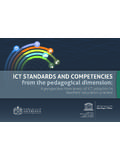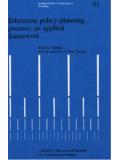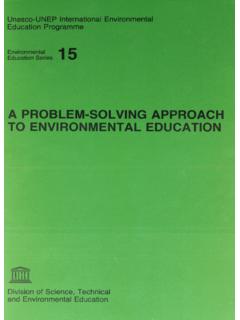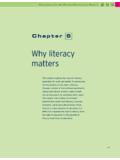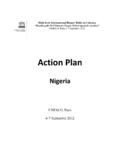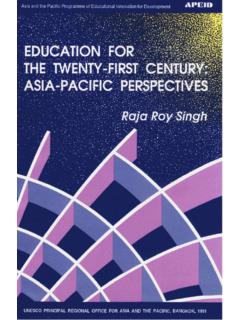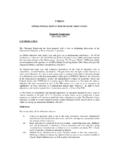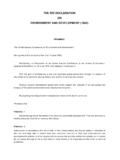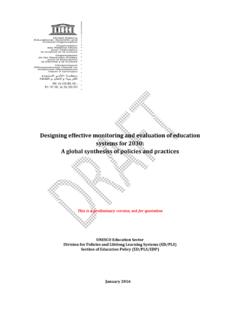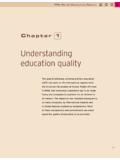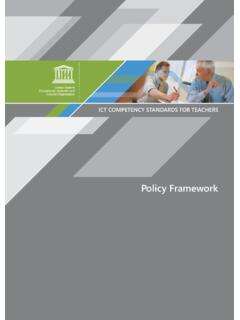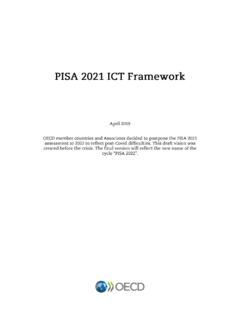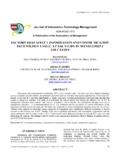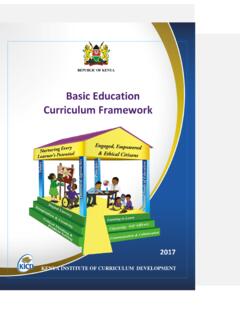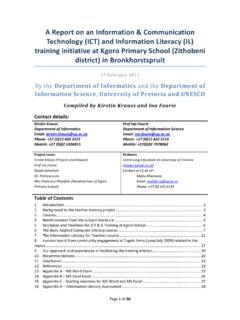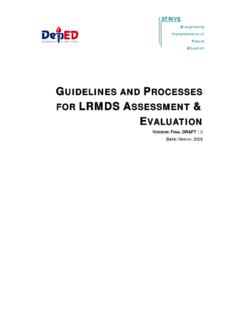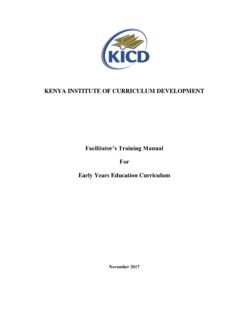Transcription of ICT Essentials For Teachers - UNESCO
1 ICT Essentials For TeachersiBased on the UNESCO ICT competency framework for TeachersICT Essentials For TeachersICT Essentials For TeachersBased on the UNESCO ICT competency framework for TeachersVersion Essentials For TeachersivPublished in 2015 by the Rwanda Ministry of EducationThe publication is available in Open Access under the Attribution-ShareAlike Rwanda(CC-BY-SA Rwanda) ( ). ICT Essentials For TeachersvCONTENTSA cknowledgements viIntroduction 1 Course material: Introduction to Blended learning 4 Unit 1: Effects of ICT related policy on the classroom and vice versa 6 Unit 2.
2 Hardware 8 Unit 3: Troubleshooting ICT problems 10 Unit 4: The Educational Internet 12 Unit 5: E-Mail & Social Media 14 Unit 6: Graphics Software 16 Unit 7: Word Processing 18 Unit 8.
3 Record Keeping (Spreadsheets) 21 Unit 9: Manage ICT for Project Based Learning 23 Unit 10: ICT & the Physical Environment 25 Unit 11: ICT to Support Traditional Pedagogy 27 Unit 12: ICT to Support Teaching the Curriculum 29 Unit 13: ICT to Support Assessment 31 Unit 14: ICT Resources for Professional Development 33 Glossary 35 ICT Essentials For TeachersviACKNOWLEDGEMENTSThe Ministry of Education would like to thank the following content developers and review and validation teams for their participation and contribution to the development of the ICT Essentials for Teachers .
4 UNESCO is also thanked for its financial and technical support in realizing the competency framework for Teachers in DevelopersCaniziyo Caritas - One Laptop per Child RwandaDr. Celestin Ntivuguruzwa - University of Rwanda College of EducationDiane Uwasenga Sengati - Rwanda Education BoardJean Marie Vianney Muhire - Workforce Development AuthorityMathias Nduwingoma - University of Rwanda College of EducationRichard Musabe - University of Rwanda College Science and TechnologyTheogene Kayumba - Ministry of EducationVincent Nyirigira - Rwanda Education BoardReview and Validation TeamClaire Uwamwiza - Ministry of EducationClaude Sebashi - British CouncilClaudine Nyirakaribu - Rwanda Education BoardDelphine Uwimana - Rwanda Education BoardEmmanuel Bikorimana- Rwanda Education BoardEmmanuel Shyaka - Ecole des Sciences ByimanaDr. Evode Mukama - University of Rwanda College of EducationFrancis Musinguzi - British CouncilGabriel Baziramwabo - Rwanda Education BoardGaurav Bajpai - University of Rwanda/College of Science and TechnologyGilbert Iragena - teacher Training College KiramboJean Damascene Habanabashaka - Rwanda Education BoardLambert Ntagwabira - Ministry of Youth and ICTP rotogene Karanganwa - Rwanda Education BoardSatu Molander - Education FinderRwandaSeth Buhigiro - Rwanda Education BoardTheodore Ngendahayo - TTC RubengeraTheogene Ndayisaba - Groupe Scolaire MarebaThierry Mbarubukeye - University of Rwanda/College of EducationVincentie Nyangoma - Rwanda Education BoardYves Ishema - Rwanda Education BoardThis publication was made possible with the support of UNESCOICT Essentials For Teachers1 INTRODUCTIONR wanda s Vision 2020 aims to transform the country into a knowledge-based.
5 Technology-led and middle income society by the year 2020. Information and Communication Technology (ICT) is considered as an ubiquitous tool that will energize the country socio-economic development. Enhancing teacher capabilities in and through ICT is one of the strategies used by the Government of Rwanda to develop a high quality skills and knowledge base, leveraging ICT across various socio-economic sectors of the country. Training Teachers in ICTs will increase the resource base and improve education delivery at all levels, hence the need to institutionalize ICT usage and training for all Rwanda ICT Essentials for Teachers provides benefits for both educators and learners in education for improved teaching and learning processes to better learner outcomes, from increased learner engagement to seamless communication with educators which provides robust opportunities that ICT offers for the social development of knowledge based-economies for Rwanda ICT Essentials for Teachers is based on the UNESCO ICT competency framework for Teachers (ICT CFT) a framework that outlines the competencies that Teachers need to integrate ICT into their professional practice.
6 The ICT CFT is a result of a partnership between UNESCO , CISCO, INTEL, ISTE and Microsoft. The Rwanda ICT Essentials for Teachers draws from a set of competencies clustered around 6 major education focus areas and focuses on the Technology Literacy growth phase of knowledge acquisition:Area of educational focusModules - Phases of knowledge acquisitionTechnology LiteracyKnowledge DeepeningKnowledge CreationUnderstanding ICT in EducationPolicy AwarenessPolicy UnderstandingPolicy InnovationCurriculum and AssessmentBasic KnowledgeKnowledge ApplicationKnowledge Society SkillsPedagogyIntegrate TechnologyComplex Problem SolvingSelf ManagementICTB asic ToolsComplex ToolsPervasive ToolsOrganization and AdministrationStandard ClassroomCollaborative GroupsLearning OrganizationsTeacher Professional LearningDigital LiteracyManage and GuideTeacher as Model LearnerICT Essentials For Teachers2On completing the Technology Literacy growth phase the Teachers will:- Outcome 1.
7 Have good basic ICT skills (Office suite, Learning Management System and Internet environments);- Outcome 2 .. be able to integrate ICT into teaching and learning, school administration and use ICT for continuous professional development;- Outcome 3 .. use ICT skills in attainment of curriculum learning objectives;- Outcome 4 .. uses ICT to access learning resources and promote research;- Outcome 5 .. use technology-based learning project and problem solving learning skills;- Outcome 6 .. be ICT literate and use ICT pedagogy in teaching and learning for promoting creativity and innovation;The Rwanda ICT Essentials for Teachers course is an example of blended learning as it includes both face to face sessions and online work. There is 5 days (38 hours) face to face training and the remaining 22 hours are conducted online for a total number of 60 notional hours. During this time participants are exposed to the course s learning management system s content and tools and have an opportunity to work through some of the course content with the physical presence of a course material is composed of existing course material, but also national and international Open Educational Resources (OER).
8 OER are teaching, learning or research materials that are in the public domain or released with an intellectual property license that allows for free use, adaptation, and Essentials For Teachers3 Key competencies Understanding ICT in EducationExplain how existing and planned national policies impact classroom practices and how their classroom practices correspond to and support policies related to 1 Curriculum and AssessmentDemonstrate how various ICT can be used in the 12 Demonstrate how various ICT tools can be used to improve assessmentUnit 13 PedagogyExplain the importance of ICT tools to support students acquisition of school subject matters knowledge and use presentation software and digital resources to support instruction and problem solving in the 11 Manage student project-based learning activities in a technolo-gy-enhanced environment to support collaborationUnit 9 ICTE xplain basic ICT concepts.
9 Use and demonstrate the use of common hardwareUnit 2 Demonstrate ability to perform basic maintenance and repair on hardware and assist in software troubleshootingUnit 3 Explain basic ICT concepts, use and demonstrate the use of software applications (particularly Word Processor)Unit 6 Explain basic ICT concepts, use and demonstrate the use of graphics softwareUnit 7 Describe the functions and purposes of the internet in the classroom and demonstrate the capacity of using internet. Explain the importance of ICT tools to support students acquisition of school subject matters knowledge and use presentation software and digital resources to support instruction and problem solving in the classroomUnit 4 Demonstrate the capability of using including e-mail, and social media functions in classworkUnit 5 Organization and AdministrationOrganise ICT to suit learning needs in either a computer lab or classroom settingUnit 10 Use in the administration of the classroom and schoolUnit 8 teacher Professional LearningLocate necessary resources that help to acquire additional subject matter and pedagogical knowledge for professional developmentUnit 14 ICT Essentials For Teachers4 Topic Area: Introduction to Blended Learning Sub-topic Area: Study Methods Subject:NAIntroduction to Blended learningTime.
10 3 hoursKey unit CompetencyStudy effectively using a blended learning methodology that links face-to-face sessions with online access to content and activities using a learning management system (LMS).Learning ObjectivesContentLearning ActivitiesKnowledge and understandingSkillsAttitudes and valuesKnow and understand how a blended learning study programme is designed to support the acquisition of ICT in education competencies. Learners should be proficient at; logging into the ICT Essentials for Teachers LMS (Moodle Server); accessing the appropriate online units and materials; using the LMS communication tools including Chat , Forums and e-mail. using the LMS assessment tools to complete quizzes and submit a determination to master the skills required to study effectively using a blended learning What is a Blended learning methodology?2. What is an LMS?3. What LMS tools will be used to support the online component of the ICT Essentials for Teachers course?
